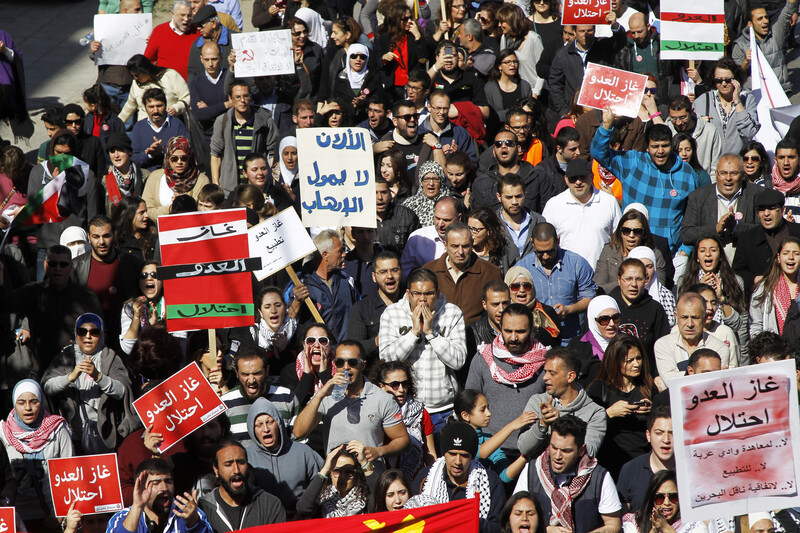The Electronic Intifada Amman 24 September 2015

Protesters in Jordan march against a government agreement to import natural gas from Israel in March.
ReutersActivists in Jordan have put the state “on trial” for a $15 billion gas deal it is aiming to conclude with Israel.
Dozens of organizations — including trade unions and political parties — have gathered under the Jordanian Campaign to Stop the Zionist Gas Deal, a coalition that was formed in December by several popular movements that began campaigning against the proposed deal in early September last year.
The deal is being negotiated by the state-owned National Electric Power Company and a consortium led by US giant Noble Energy. If implemented, it would involve the extraction of more than 300 million cubic meters of natural gas from the Israeli-controlled Leviathan gas field in the Mediterranean Sea.
On 5 September, members of the public took the Jordanian government and the state-owned company to task at a popular tribunal.
Among the charges considered were that the deal would involve funding Israeli terrorism, threaten Jordan’s national security and aid war crimes against Palestinians.
After concluding that the proposed deal would violate Jordanian anti-terror law and the country’s penal code, the tribunal declared it null and void.
Although summons were delivered to the offices of the prime minister and the national company ahead of the recent tribunal hearing, they failed to send representatives.
Suspect agenda
Ayoub Abu Dayyeh, founder and president of the Environmental Conservation and Sustainable Energy Society, told the tribunal that there are ample alternative sources that could meet Jordan’s energy demands.
Abu Dayyeh argued that the government’s insistence on importing gas from Israel despite lack of economic necessity exposes the political and suspect agenda behind the deal.
One year ago, the National Electric Power Company signed a letter of intent to import gas from the Leviathan gas field, off the shores of Haifa.
The consortium involved in the deal includes a number of Israeli firms.
The deal, which is set to last for 15 years, would mark the most significant deepening of relations between Jordan and Israel since the controversial peace treaty of Wadi Araba in 1994.
Despite the fact that Jordan is officially at peace with Israel, the treaty is widely opposed by its public.
“Today we are not only rejecting compulsory funding of Israeli terrorism that would be imposed upon us by this deal but also crucially we are standing against submitting our sovereignty and national will to an entity that has never respected international conventions,” said Khaled Al Shakaa, an organizer of the tribunal, who also campaigns for boycott, divestment and sanctions against Israel.
Large-scale mobilization against the deal has made it more difficult for the Jordanian government to ignore public disapproval, especially in the light of the major recent Egypt.
Hisham Bustani, a coordinator of the campaign, pointed out that it is led by many women and young people, which makes it distinct from other popular movements. According to Bustani, this “reflects the vitality of our campaign.”
Solar potential
Rather than sign a gas deal with Israel, Jordan could generate vast amounts of renewable energy.
Jordan has a sunnier climate than Germany, the world’s leading user of solar energy.
The London-based ecological and social justice group Platform published a study on the gas deal in November last year.
Platform contended that the agreement will make Jordan dependent on Israel for two-thirds of its energy supply. This means that, in the event of political disagreement between the two parties, Jordan’s energy security could be seriously threatened.
Mika Minio-Paluello, a Platform representative and one of the witnesses at the tribunal, said: “Even if such fear never materialized, the mere threat that the deal poses on Jordan’s energy security would deter Jordan from developing genuinely independent policies.”
The need to oppose the deal has been underscored since the tribunal, given the increasing Israeli attacks on al-Aqsa mosque in Jerusalem.
Jordan is the official custodian of Jerusalem’s Muslim and Christian places of worship.
Jordanians would pay $8.4 billion directly to the Israeli treasury as a result of the gas deal, the Platform study calculated. Jordan would, therefore, be contributing financially to the preservation of Israel’s apartheid system.
Anger at this deal looks set to continue.
Additional reporting by Patrick O. Strickland.
Juman Asmail is a human rights activist and community organizer.


